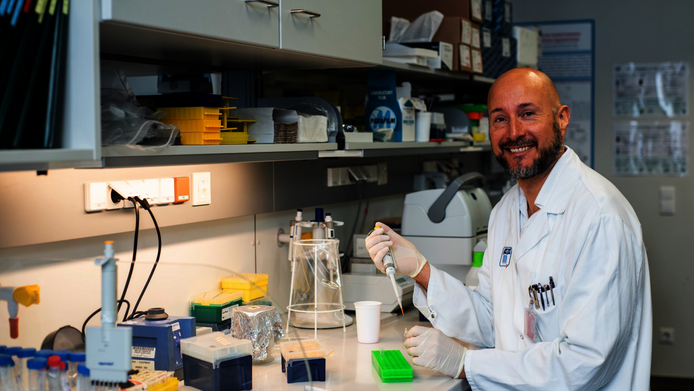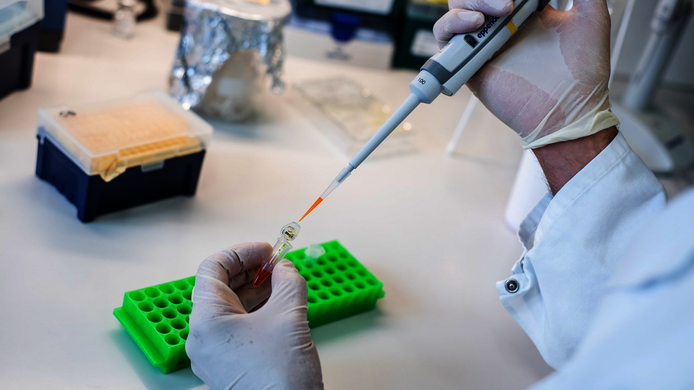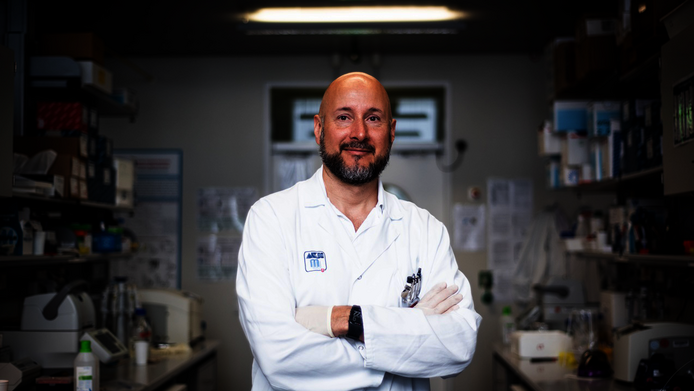Coronavirus: from molecule to drug

He is currently one of the most coveted interview partners with regard to the coronavirus: Christoph Steininger, virologist at the Medical University of Vienna. In view of the uncertainty palpable everywhere, he considers himself and his colleagues to have a clear responsibility of answering queries from the media in order to meet concerns and open questions with facts.
Viruses: a complex field of research
Such facts and findings as are based on years of basic research by scientists in laboratories. It is a long and sometimes rocky road from research on an issue to producing some verifiable “value” for society – like a drug. “We still do not fully understand the workings of viruses and what mechanisms lead to the outbreak of a disease,” says Steininger. Some outbreaks even go unnoticed. Steininger, a specialist in internal medicine, cites the example of the Zika virus, which broke out in Latin America in 2015 and caused severe damage to unborn children. “It had probably arrived unnoticed in Brazil a year before that. We know the virus, but nobody would have expected it in that region of the world,” he recalls.
Research under great pressure
With COVID-19, a new type of virus broke out in China – just like SARS about ten years ago. Chinese scientists were quick to decode the genome, and currently dozens of research teams around the world are working on the development of a vaccine against the virus, which is spreading globally. At this point it is difficult to predict when effective therapies and a vaccine will be available; but it can be said that this time it will be a great deal faster than under normal circumstances.
“Unprecedented speed”
The tendering and application procedures for the most recent EU call relating to coronavirus research corroborate this statement. Under normal circumstances, researchers have several months within which to apply, this time it was only ten days. Nevertheless, 91 research consortia have submitted an application. Steininger is confident that there will be a vaccine in the coming months. According to him, two research groups – from Australia and the USA – already have a vaccine in hand, which is currently being evaluated. “The speed is unprecedented,” says the virologist.
Good news: coronavirus has not mutated yet
He explains this not only by the bundling of many resources into the current issue, but also by the fact that – contrary to all fears – the coronavirus has not changed since its outbreak at the end of December 2019 in the Chinese metropolis of Wuhan. This is good news, because it means that an individual who has contracted the coronavirus once is immune to the pathogen and cannot be infected a second time. “Once a critical level of immune people is reached, the virus can no longer replicate,” says Steininger. This distinguishes corona from the flu virus, which changes every year. For this reason, Steininger also considers it unlikely that the corona virus will establish itself and reappear annually during the flu season.
Vaccine against HIV under evaluation
As can be seen from the example of other diseases, it often takes researchers many years to develop an effective vaccine. The HIV virus is a case in point: it was identified in 1986 as triggering the AIDS immunodeficiency syndrome, and today there is still no effective vaccine against the pathogen. According to Steininger, this is mainly due to the fact that HIV mutates quickly in patients and it is difficult to develop a vaccine that is effective against all different variants. In spite of this, Steininger believes that a promising vaccine candidate is currently being evaluated.

Problematic CMV virus
In the context of a research project funded by the Austrian Science Fund FWF, Steininger is investigating the so-called Cytomegalovirus, or CMV for short, which is the most common cause of congenital malformations. Infections with the CMV virus during pregnancy lead to serious damage in the unborn child – from hearing deficiencies to neurological complications such as encephalitis and miscarriages. CMV is also a major problem for immunocompromised patients after organ or bone marrow transplants, and it is the most common cause of serious complications caused by infections.
Scientific breakthrough
Steininger's research group recently achieved a major breakthrough in this field: it has been known for quite some time that the vitamin D metabolism is important for the maintenance of transplanted organs. The researchers have now also been able to show, that CMV down-regulates the vitamin D metabolism. This has far-reaching consequences for patients after organ and bone marrow transplants and can even lead to the dying off of the organ.
Research and medicine
The decoding of this mechanism is one of those moments of success that Steiniger, who hails from Upper Austria, probably had in mind after his school-leaving exam when he decided to study medicine. In his eyes, Steininger says, medicine combines contact with people, which is very important to him, with the opportunity to be actively involved in science. “I know of few professional fields where these two things are so easily reconciled,” says the physician, who is also a passionate researcher. Of course it is a great challenge to work in two major fields, “but it is exactly this challenge that I love,” he says with unbridled enthusiasm.
Schrödinger Fellowship as a milestone
After studying medicine at the University of Innsbruck, Steiniger, now 46 years old, qualified for a professorship at the Medical University of Vienna and in 2008 spent a year at the University of California in San Diego in the context of an FWF-funded Erwin Schrödinger Fellowship. He describes that research stay as a milestone in his scientific career. During the fourteen months he spent there he made a decisive discovery: he identified a protein responsible for the process that repeatedly stimulates chronic leukaemia.
American spirit
What seems even more important to Steininger than this scientific success was the hands-on experience of a different research system during his stay in San Diego. “The environment was extremely motivating and enriching. One is forced to raise and manage funds oneself. Nothing is taken for granted,” he recalls. This “spirit” continues to be of use to him to this day, because: “With this mindset you always find interesting partners and investors who are willing to collaborate on exciting projects.”
Not a one-man show
After his stay in the USA, the young scientist first completed his specialist training in internal medicine in Vienna. This was a step which he describes as a considerable leap: “From assistant to specialist, that also means a different environment, different research possibilities.” The research group he set up at that time has grown tremendously and is now working on two dozen different and very promising projects. This balancing act between clinical work and research is only possible with competent and committed collaborators. “I am not a one-man show,” Steininger notes with conviction.
A productive environment
Among his current research projects there is not a single one without at least some involvement from another research team. “It's a huge network. We exchange ideas, inspire and support each other,” reports Steininger from his research base at the laboratory of the Vienna General Hospital. He considers it enormously important to be embedded in a productive environment. To any young colleague he sincerely recommends choosing not only a project but also keeping an eye on the working environment it offers.
Mentoring: a win-win situation
Steininger also considers the influence of mentors to be particularly important and senses a deficit in this respect here in Austria. “On the one hand, young scientists can benefit from networks of experienced colleagues and, on the other hand, proficient collaborators carry a good reputation out into the world, which in turn helps the mentors,” is Steininger’s comment on this win-win situation, and he goes on to note: “Unfortunately, this has not yet arrived in Austria.” Steininger himself was lucky to have mentors on his career path. One of them was the virologist Franz Allerberger, with whom he published his first scientific publication. It is thanks to another mentor – and to chance – that Steininger is now working at the Medical University of Vienna. At a congress, Clara Larcher from the University of Innsbruck’s Institute for Hygiene met the virologist Heidemarie Holzmann, who was looking for a collaborator at the time. In this way, Steininger came from Innsbruck to the Department of Virology in Vienna.
Passion and openness
And how does he see his role as a mentor? When selecting his team members, Steininger pays less attention to their CVs and more to their enthusiasm and passion. “It's important to me that they are passionate about something!” The willingness to change perspective and go down new paths when obstacles arise is another important characteristic that Steininger looks for. “Many projects have taught me that unexpected results are an indication of something relevant having been overlooked. This is where you need to be open-minded, in order to see the positive sides and explore new routes.”
Research and clinical work
Steiniger has no typical working day, because every day is different: looking after patients, discussing ongoing projects with team members, meeting colleagues from other research groups and – with heightened frequency at the moment – interviews with the media. “The days are always long, but very varied, and it never gets boring,” is how Steininger sums it up. According to him, the challenge in everyday clinical practice consists of developing a sense of where diagnosis and therapy are clear and where it is important to keep asking questions because there are findings that do not fit. Here there is a clear parallel, in his fundamental attitude, between science and clinical work: being willing and open to the exploration of information that does not fit the picture.
More awareness of basic research
When it comes to the significance of basic research, Steininger would like to see more awareness in Austria of the fact that it forms the basis for the development of many products. Without the sheer curiosity of researchers in the past, we would have no batteries and no X-ray radiation today, for instance. Steininger also sees the researchers themselves as responsible for raising awareness: “We, too, must communicate more clearly the significance of our work for society – why, for example, the investigation of a molecule can be important for the development of a drug,” he says. If not before, this certainly becomes quite obvious when – as is currently the case – there is an outbreak of a new type of virus.
Personal details
The virologist Christoph Steininger is an Associate Professor at the Medical University of Vienna and a specialist in internal medicine at the Vienna General Hospital. He studied medicine at the University of Innsbruck and acquired his professorial qualification in internal medicine at the Medical University of Vienna. In addition to numerous research stays, including in Thailand, Israel, Peru and Germany, an FWF-funded Erwin Schrödinger Fellowship took him to the University of California in San Diego, USA, from 2008 to 2009. Steininger is head of the Institute for Microbiome Research set up by the Karl-Landsteiner Society. Among numerous other distinctions, he received the Young Researcher Award of the European Society of Clinical Microbiology and Infectious Diseases in 2007.






